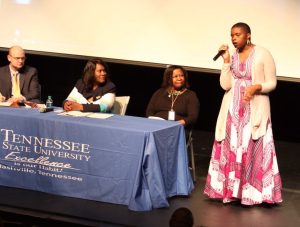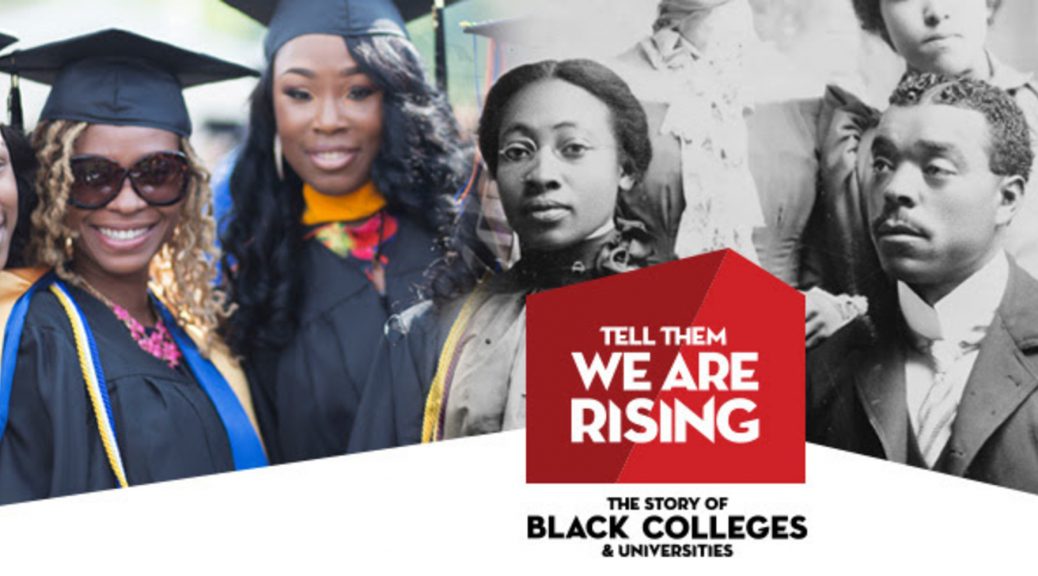NASHVILLE, Tenn. (TSU News Service) – Tennessee State University hosted a panel discussion Monday night about the history and impact of historically black colleges and universities.

The event in TSU’s Performing Arts Center was sponsored by TSU, Fisk and the Tennessee Higher Education Commission. Following the discussion, the PBS documentary, “Tell Them We Are Rising: The Story of Black Colleges and Universities,” was shown to the audience. The documentary first aired nationwide on Feb. 19.
“This documentary shows our purpose, this documentary shows our mission, this documentary shows our need,” TSU President Glenda Glover said during her greetings. “It shows we have risen.”
HBCUs have a history dating back to 1837, but most of them began as Freedmen’s schools after 1864, and grew to some 240 schools, colleges, and universities. Some 119 were eligible for collegiate accreditation by 1929. Today, there are about 100 accredited HBCUs – and their impact is felt nationwide, historians say.
“HBCUs … produce the vast majority of the professional class,” Dr. Learotha Williams, an associate professor of history at TSU and panelist, said before the event. “Doctors, lawyers, professors, engineers — If you search their economic background, you’ll see that in some way or another they were affiliated with an HBCU, either as an undergrad, or via graduate school.”
Mike Krause, THEC’s executive director, said the state is committed to helping Tennessee’s HBCUs reach their goals. He noted that Tennessee is the first state to have an HBCU initiatives director whose main objective is to focus on the needs of HBCUs.
“There’s no way that Tennessee reaches our goals as a state, unless we make sure that HBCUs reach their goals,” Krause said. “We want to make sure that HBCUs succeed.”
Krause added that HBCUs “offer students a special experience,” which Memphis native Marquis Richardson said attracted him to TSU.

“It’s more black people, more black faculty, more black administration,” said Richardson, a junior majoring in business. “It’s good learning from African Americans who are knowledgeable in their field. It gives me motivation to do good in my field as well.”
TSU business major Marquis Richardson said Tennessee State’s nationally recognized programs and esteemed alumni attracted him to the university.
When Sydnie Davis was pondering what higher education institution to attend after graduating from high school, the Nashville native concluded she wanted an HBCU experience – a Big Blue one.
“When I got here, I fell in love,” says Davis, a fifth generation TSU Tiger now in her junior year. “I saw what my family had seen the many generations before me. I feel I’ve been able to succeed like no other, and the family atmosphere and love you feel on campus is overwhelmingly positive. HBCUS are one of the last safe havens for African American students.”
Department of Media Relations
Tennessee State University
3500 John Merritt Boulevard
Nashville, Tennessee 37209
615.963.5331
About Tennessee State University
With more than 8,000 students, Tennessee State University is Nashville’s only public university, and is a comprehensive, urban, co-educational, land-grant university offering 38 bachelor’s degree programs, 25 master’s degree programs and seven doctoral degrees. TSU has earned a top 20 ranking for Historically Black Colleges and Universities according to U.S. News and World Report, and rated as one of the top universities in the country by Washington Monthly for social mobility, research and community service. Founded in 1912, Tennessee State University celebrated 100 years in Nashville during 2012. Visit the University online at tnstate.edu.
